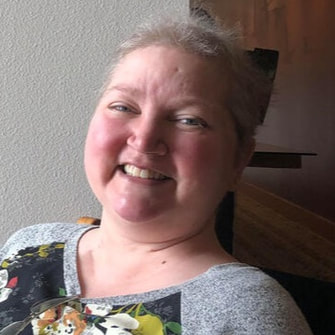
Kim, 34, dealt with her lung cancer diagnosis by convening her friends to talk about her death and touring a cremation facility.
At the age of 34, Kim, a non-smoker, got unexpected news. As she wrote on her blog, Aquarius vs Cancer, “I’ve got lung cancer and I’m not very happy about it. It pretty much sucks.”
After Kim and I met through a mutual friend and she learned about my work as a Celebrant and Home Funeral Guide, she sent me this email: “So. I'm wondering if we could meet up and talk about end of life planning? I'm just trying to get my ducks in a row.”
As she'd written on her blog, “I’m the kind of girl who likes to know where I stand at all times. I’m often most uncomfortable when I don’t know what I think or feel on a particular topic or subject.”
We met and agreed that I would create a customized set of questions to support Kim in thinking through what she wanted to have happen around and after her death. I lent her my copy of Stephen Jenkinson's slim work book, How It All Could Be, which he describes as “part meditation and part guided study – that begins the deep human project of learning what dying well could be, and what dying asks of us all... for anyone trying to approach dying with soul and intelligence intact.”
I worried that my list of questions, coupled with the Jenkinson booklet, might produce paralysis. Not for Kim. When she found it daunting, what did she do? She invited 12 of her closest friends to come to her home on a Friday night for pizza, wine, and a conversation about death. Hers. And theirs.
I was privileged to observe this tender, brave, joy- and grief-filled gathering. They laughed, a lot. They cried. They told stories. They shared answers they didn't know they had. They wondered together. And through it all, Kim presided from a cushion on the floor of her fabulously smart mid-century living room, keeping the group working through the questions she'd culled:
Part 1
Part 2
A few days later Kim reported “feeling very good about things today.” She was busy typing up her notes and said, “It would have been impossible for me to get the same high quality results answering these questions on my own.” What struck me most about that night was that Kim had invited us all to begin exercising our grief muscle, to cultivate this neglected capacity in the company of others.
Later, as Kim and I used that discussion to create a brief outline of instructions to guide her spouse at the time of her death, she asked me if she could go see where cremations happen. I called a locally-owned facility offering low-cost direct cremation and asked if they would provide a tour. After a somewhat awkward greeting by one of the funeral directors on staff, who seemed a bit unsure what to do with this young woman investigating the mechanics of her eventual disposition, we were left in the care of one of the facility’s operators. This behind-the-scenes fellow, a young man who didn’t often interact with clients, was clearly gratified by Kim’s interest in the nitty gritty details of his work. He mentioned how touching he found it when family members participated in the cremation process, and how lonely it could be, cremating the deceased without their loved ones present.
Our trip to the crematorium was graced by one other detail that day. As Kim and I waited in the lobby, in walked a man from her support group, there to pick up his wife’s remains. Through Kim’s introduction, I was helping him with the memorial service. He’d been dreading this task, a tough one to do alone. He was astonished and delighted to see us there in the lobby, a small and unexpected moment of solace.
We all get by with a little help from our friends.
At the age of 34, Kim, a non-smoker, got unexpected news. As she wrote on her blog, Aquarius vs Cancer, “I’ve got lung cancer and I’m not very happy about it. It pretty much sucks.”
After Kim and I met through a mutual friend and she learned about my work as a Celebrant and Home Funeral Guide, she sent me this email: “So. I'm wondering if we could meet up and talk about end of life planning? I'm just trying to get my ducks in a row.”
As she'd written on her blog, “I’m the kind of girl who likes to know where I stand at all times. I’m often most uncomfortable when I don’t know what I think or feel on a particular topic or subject.”
We met and agreed that I would create a customized set of questions to support Kim in thinking through what she wanted to have happen around and after her death. I lent her my copy of Stephen Jenkinson's slim work book, How It All Could Be, which he describes as “part meditation and part guided study – that begins the deep human project of learning what dying well could be, and what dying asks of us all... for anyone trying to approach dying with soul and intelligence intact.”
I worried that my list of questions, coupled with the Jenkinson booklet, might produce paralysis. Not for Kim. When she found it daunting, what did she do? She invited 12 of her closest friends to come to her home on a Friday night for pizza, wine, and a conversation about death. Hers. And theirs.
I was privileged to observe this tender, brave, joy- and grief-filled gathering. They laughed, a lot. They cried. They told stories. They shared answers they didn't know they had. They wondered together. And through it all, Kim presided from a cushion on the floor of her fabulously smart mid-century living room, keeping the group working through the questions she'd culled:
Part 1
- Discussion: What defines a “full life”?
- Discussion: What would you do if you had one day to live? What do your answers say about your values, convictions, soul....
- How would you describe me?
- How would you describe my essence in one word?
- Do any songs remind you of me?
- Have I taught you anything?
- What do you think you will remember most about me? What would be my legacy?
Part 2
- Discussion: Do you want an end-of-life gathering? If so, what do you call it?
- Do any of you want to speak* at my end-o-life service? *rules apply
- I will be cremated. Would people like to dispose of their own bit of my ashes?
- Would any of you want to attend my cremation?
- Discussion: What happens when you die? When, what, and who do your opinions come from?
- What will people miss about me?
- Do you have any memorable moments that involve me?
- Discussion: When does the transition from “I will die” to “I am dying” happen?
A few days later Kim reported “feeling very good about things today.” She was busy typing up her notes and said, “It would have been impossible for me to get the same high quality results answering these questions on my own.” What struck me most about that night was that Kim had invited us all to begin exercising our grief muscle, to cultivate this neglected capacity in the company of others.
Later, as Kim and I used that discussion to create a brief outline of instructions to guide her spouse at the time of her death, she asked me if she could go see where cremations happen. I called a locally-owned facility offering low-cost direct cremation and asked if they would provide a tour. After a somewhat awkward greeting by one of the funeral directors on staff, who seemed a bit unsure what to do with this young woman investigating the mechanics of her eventual disposition, we were left in the care of one of the facility’s operators. This behind-the-scenes fellow, a young man who didn’t often interact with clients, was clearly gratified by Kim’s interest in the nitty gritty details of his work. He mentioned how touching he found it when family members participated in the cremation process, and how lonely it could be, cremating the deceased without their loved ones present.
Our trip to the crematorium was graced by one other detail that day. As Kim and I waited in the lobby, in walked a man from her support group, there to pick up his wife’s remains. Through Kim’s introduction, I was helping him with the memorial service. He’d been dreading this task, a tough one to do alone. He was astonished and delighted to see us there in the lobby, a small and unexpected moment of solace.
We all get by with a little help from our friends.
Adapted with permission from Holly Pruett Celebrant, With a Little Help from Her Friends.
Read more stories...
Read more stories...
